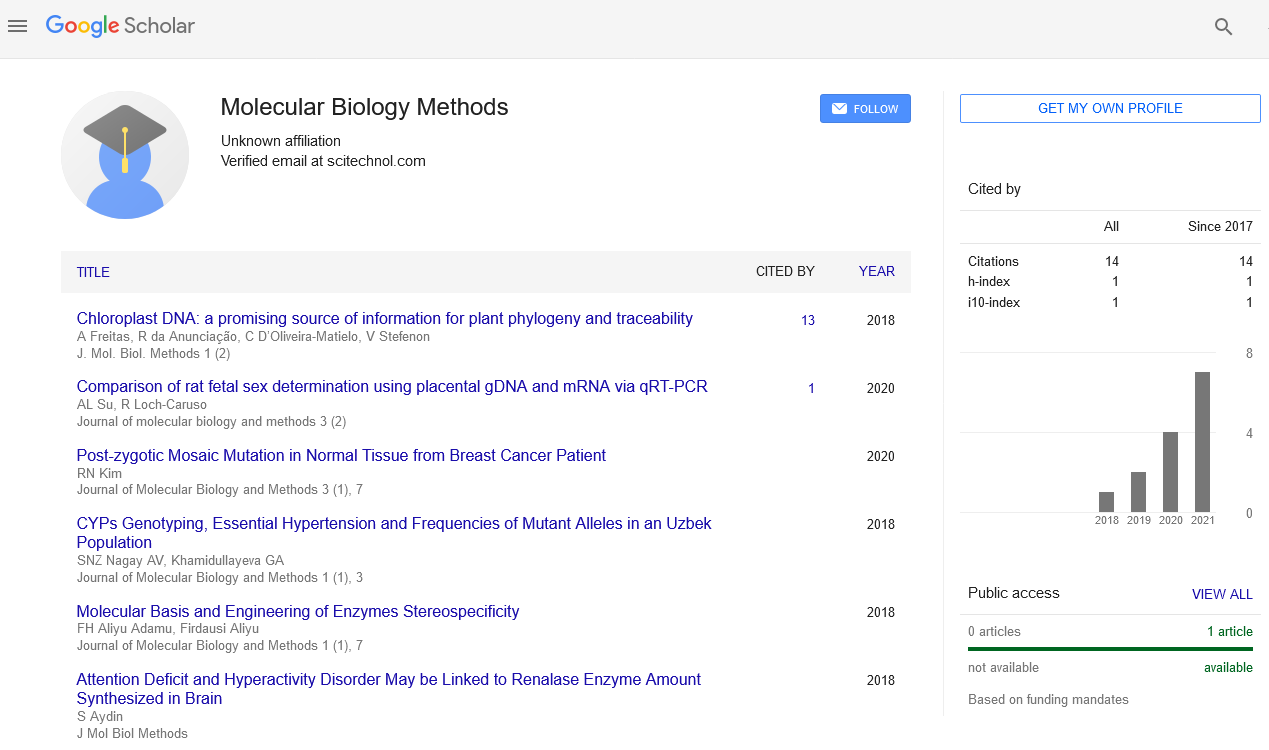Perspective, J Mol Biol Methods Vol: 6 Issue: 1
Exploring Microbiology's Impact on Health and Biotechnology
Gregorio Zon*
Department of Food Science and Nutrition, University of Zambia, Lusaka, Zambia
*Corresponding Author: Gregorio Zon
Gregorio Zon, Department of Food Science and Nutrition, University of Zambia, Lusaka, Zambia;
E-mail: gregoriozon22@gmail.com
Received date: 20 February, 2023, Manuscript No. JMBM-23-94724;
Editor assigned date: 22 February, 2023, PreQC No. JMBM-23-94724 (PQ);
Reviewed date: 09 March, 2023, QC No JMBM-23-94724;
Revised date: 16 March, 2023, Manuscript No. JMBM-23-94724 (R);
Published date: 23 March, 2023, DOI: 10.4172/JMBM.1000129
Citation: Zon G (2023) Exploring Microbiology's Impact on Health and Biotechnology. J Mol Biol Methods 6:1.
Abstract
Description
Microbiology is the study of microorganisms, which include bacteria, viruses, fungi, protozoa, and other microscopic organisms. These tiny beings play a significant role in various aspects of human health and biotechnology. From causing infectious diseases to providing beneficial applications in the fields like medicine, agriculture and industry microbiology has a profound impact on our lives. Microorganisms are responsible for numerous infectious diseases in humans, animals, and plants. Microbiology plays an important role in understanding the pathogenesis of the diseases, identifying the causative microorganisms, and developing strategies for their prevention, diagnosis and treatment. The mechanisms of microbiology involve the study of the structure, physiology, metabolism, genetics, and behavior of microorganisms. Microorganisms exhibit diverse characteristics and exhibit unique mechanisms for survival, growth, and reproduction. For example, bacteria can reproduce by binary fission, where a single cell divides into two identical daughter cells, while viruses need a host cell to replicate. Microbiology studies the mechanisms of microorganisms' interactions with their environment, including their ability to adapt to changing conditions, acquire nutrients, evade host immune responses, and cause diseases. Microbiological techniques are used in diagnosing infectious diseases by isolating and identifying microorganisms from clinical samples such as blood, urine, sputum, and tissue specimens. Microscopy is a fundamental technique used in microbiology to visualize microorganisms. Light microscopy, electron microscopy, and fluorescence microscopy are commonly used methods to observe microorganisms and their structures at different levels of resolution. Biochemical and molecular techniques are used to study the metabolism, physiology, and genetics of microorganisms. These techniques include DNA sequencing, Polymerase Chain Reaction (PCR), enzyme assays, chromatography, and spectrophotometry, among others. Genomic and proteomic analysis involves the study of the entire genetic and protein makeup of microorganisms. Techniques such as next-generation sequencing, gene expression analysis, and mass spectrometry are used to analyze the genome and proteome of microorganisms and gain insights into the biology. Additionally, microbiology plays a key role in the development of antimicrobial drugs, vaccines, and other therapeutics for the treatment of infectious diseases. Microorganisms are extensively used in biotechnology for various purposes. For example, genetic engineering techniques involve the manipulation of microorganisms to produce recombinant proteins, enzymes, and other bioactive compounds. Microbes are also used in the production of antibiotics, biofuels, enzymes, and other industrial products. Microbiology also plays a significant role in the field of agricultural biotechnology, where microorganisms are used in crop protection, soil fertility enhancement, and plant growth promotion. Microorganisms are employed in various industrial processes, such as food and beverage production, pharmaceuticals, biofuel production, and waste management. Microbiology is a rapidly evolving field with constant advancements and innovations. New areas of study, such as metagenomics, microbial ecology, and synthetic biology, are expanding the understanding of the microbial world and its applications in health and biotechnology.
Conclusion
Microbiology plays an essential role in understanding and harnessing the potential of microorganisms for human health and biotechnology. It has the ability to uncover new treatments and cures for currently incurable diseases, as well as new methods for producing sustainable products. From diagnosing and treating infectious diseases to exploring their applications in biotechnology and industry, microbiology has a significant impact on various aspects of lives. Moreover, microbiology has also played a vital role in the development of biotechnology, enabling us to produce essential products sustainably.
 Spanish
Spanish  Chinese
Chinese  Russian
Russian  German
German  French
French  Japanese
Japanese  Portuguese
Portuguese  Hindi
Hindi 